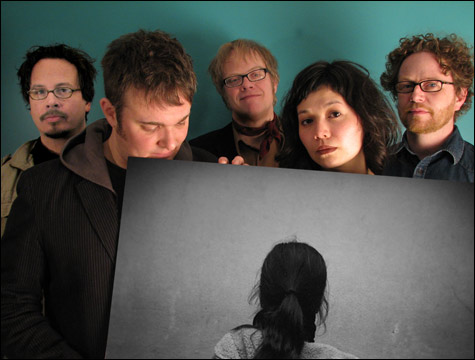
WHY AORTA: During the creation of Central Chambers, Price’s doctor gave him news about his heart: “It could blow up any day, pretty much.” |
Against the grainy mix of plucky guitars and water-drop bells in "Burning Hearts," Flora Reed recalls a long-ago tryst that she traces from Paris cafûs across tarmacs and ancient ruins. The couple share secrets, and their shadows are burnt into walls by flashbulbs, and everything seems to float along in a peaceful sea of tremolo guitars and boy-girl harmonies. That opening of the first verse provides the most wistful moment on the Winterpills' new Central Chambers (Signature Sounds/Soft Alarm), an album full of bad news, bummers, and let-downs.
But then Reed sings, "We're saying goodbye to Hiroshima," and the romantic jet-setting takes a bit of a nose dive. Repeated throughout the song, the line starts to sound anthemic. Unlike almost every other object and character in the album, the humble subjects in "Burning Hearts" have at least had their memories etched into something rock solid. Explosions leave lasting impressions.

It may be an over-the-top bit of martyring grandeur, but that's sort of what Winterpills are great at. Head songwriter and vocalist Philip Price (Reed's husband), who's bringing the Northampton band to Club Passim this Sunday, is all about the quiet, discreet use of cinematic disaster scenarios: "Take the lights away from everything" ("Take Away the Words"), "We die quickly in outer space" ("We'll Bring You Down"). And the passing resemblance to Elliott Smith in his own whispered vocals doesn't end there: both songwriters transform human bodies and souls and feelings into moldy old objects in houses or rusty tools in the closet — anything to nail down and make real the lonely old process of living and dying. If Price were in a Richard Brautigan novel, he'd be the elephant umbrella stand in the foyer.
It was, moreover, during the creation of Central Chambers that Price's doctor gave him news about his heart: "It could blow up any day, pretty much."
"I'm fine, really, for anyone who's actually concerned," he assures me over the phone from Northampton. He had been diagnosed with a potentially catastrophic aortic aneurysm. "Basically, I have to do a Mediterranean diet. Which is obviously okay."
He goes on, "It ended up subconsciously informing all the songwriting. We got together and started looking at all the songs, and it all seemed to add up." "Secret Blue Thread"? Circulatory system. "Gentleman Farmer"? Heart attack. "Weary Heart?" Well . . .
"I mean, even considering that the heart is such an obvious songwriting clichû anyway, it still seemed like there was even more behind it."
Give his conscious mind some credit, though — frailty and sadness have always run through Pierce's output, whether in his old indie-pop band the Maggies or in his solo work. He dove into Northampton in the first place because of its vaguely mopy underbelly pedigree. "It was amazing to just be near the home of so much early stuff like Dinosaur Jr. and the Pixies. Thurston Moore and Kim Gordon stop by the video store I work at." A couple of weeks ago he was sitting in the tiny Pleasant Street Theatre watching Thomas Alfredson's brooding Swedish vampire flick, Let the Right One In. "About halfway through, I realized the guy doing all the gasping and whooping down the aisle from me was David Byrne. I guess he was playing across the street that night."